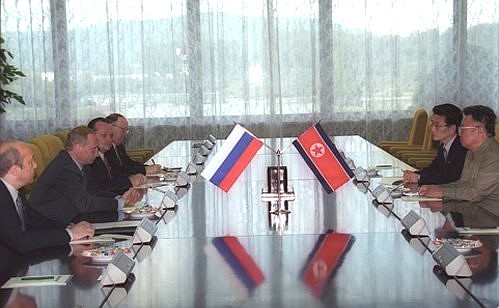 Photo Credit: www.kremlin.ru
Photo Credit: www.kremlin.ru
Putin is Speaking Up on North Korea and the U.S. Should be Wary
The months-long war of words between North Korea and the United States has reached new heights recently, in the aftermath of the North allegedly testing a hydrogen bomb and now potentially preparing for more long-range missile tests. Leaders from across the region and the world have been expressing their concern and offering support to try and reach a peaceful solution on the Korean Peninsula. Now, suddenly, Russian President Vladimir Putin has waded into the diplomatic fray on Korea, which raises questions about how Russia could help or hinder the situation in the region.
Russia has largely avoided deep involvement in the Korean issue over the past twenty years. While it sits on the Six Party Talks on denuclearization, those talks have been derailed since North Korea walked out in 2009 and resumed its nuclear program. But the situation has changed following North Korea’s most recent nuclear test. Over the past week, Putin has suddenly been propelled to the forefront of the Korean issue. He’s made forceful statements on the ongoing crisis, stating that an escalation of “military hysteria” over North Korea’s provocative activities could cause a “global catastrophe,” and condemned sanctions as “useless,” claiming “They’d [North Korea] rather eat grass than abandon their [nuclear weapons] program.”
Putin’s bombastic language aside, it is possible that Russia could play a constructive, stabilizing role in this crisis. After all, Russian cooperation was crucial in securing the Iran Nuclear Deal in 2015, and Russia has key economic interests at stake in both Koreas. While trade between Russia and North Korea had been decreasing, it has more than doubled in the first quarter of 2017. Meanwhile, South Korea is within the top ten for both Russia’s export and import partners, with Russia being South Korea’s eighth biggest import partner. These trade ties not only give Russia a reason to try and prevent conflict on the Peninsula, but also potential leverage that it could use to push the two Koreas towards a peaceful settlement—particularly if it coordinates with the United States, China, Japan, and other regional powers.
However, constructive Russian actions by no means can be taken as a given. As Dr. Pavel Baev of the Peace Research Institute in Oslo pointed out following the finalization of the Iran Nuclear Deal, Russia mostly helped that deal succeed by not acting as a spoiler and ruining it. In the Korean case, Putin’s attitude towards the crisis has been highly critical at best, and openly supportive of Pyongyang at worst. Putin has argued that it is “impossible to scare” North Korea into abandoning its nuclear program, no matter what economic incentives are offered, as North Korea views the program as its only means of self-defense and that giving it up would be “an invitation to the cemetery.” In his view, this is largely the fault of U.S. aggression, providing the 2003 Invasion of Iraq as an example of what the North fears most, driving its pursuit of nuclear weapons.
Russia and China have made it clear neither nation will not tolerate a 2003 Iraq-style solution in North Korea. The two countries have acted together in the U.N., and put forward what both call the “four nos”: no to regime change, regime collapse, accelerated reunification, and military deployment north of the 38th parallel—the dividing line of the two Koreas. It was this firm line that forced the U.S. to tone down new sanctions against North Korea at the U.N., and Russia and China have been increasing calls to resume dialogue with the North rather than punish it. In that way, Russia has already acted as a spoiler and limited the U.S.’s freedom of action.
The U.S. shouldn’t dismiss opportunities for real cooperation with Russia out of hand, as the Iran case shows. But Russian intervention in Syria has already shown how seriously Russia can undermine U.S. national interest when it puts enough energy and resources into being a spoiler. The U.S. must remember how Russia views international relations: as a zero sum game where it hopes to gain power at its rivals’ expense. For that reason the U.S. needs to act cautiously in how big of a role it will tolerate for Russia in resolving the crisis. If Russia takes the initiative and makes itself indispensable to security on the Korean Peninsula, it will be able to act as a spoiler in an area that could have far greater repercussions for U.S. National Security than Syria did, and with far greater stakes.






